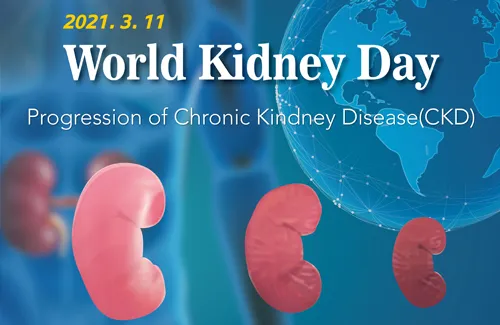
Chronic kidney disease (CKD) is a progressive loss in kidney function over time. Most people have no symptoms until severe CKD occurred. A person can lose up to 90% of the kidney functions before having any symptoms. If the patients don’t get the proper treatments, they can end up with kidney failure and receive dialysis for the rest of their life.
In Taiwan, thousands of people suffer from nephropathy or CKD. According to the Taiwan Ministry of Health and Welfare, it costs over 40 billion NT dollars to the Medicare beneficiaries in 2019. Therefore, the early diagnosis and prevention of CKD are urgent worldwide. To raise the awareness of kidney healthcare, the International Society of Nephrology (ISN) started an annual global campaign, World Kidney Day, every second Thursday in March.
Kidney diseases often result from high blood pressure (hypertension), diabetes, or kidney damage. When the kidneys are damaged, and the filtration function is blocked, then the wastes and the uremic toxins will accumulate in the circulation.
The uremic toxins can be divided into three major types, non-protein-bound small molecules (<500 D) such as urea and creatinine, middle molecules (> 500 D) such as peptides and β-2 microglobulins, and protein-bound small molecules such as indoxyl sulfate (IS), indole-acetic acid, and p-cresyl sulfate.
When the glomerular filtration rate decreases, protein-bound molecules become challenging to be cleared in the blood. The accumulation of protein-bound uremic toxins will further damage the renal function and cardiovascular system. Worst of all, the patient with the end stage of CKD has a limited ability to remove protein-bound uremic toxins by dialysis. Therefore, protein-bound uremic toxins are good markers for CKD diagnosis since they directly reflect the glomerular filtration rate. Also, compared with non-protein-bound molecules, protein-bound uremic toxins can’t be eliminated easily, so they are unlikely to give false negative results. That’s why we aim to develop the IS diagnostics.
We are pleased to introduce the LEADGENE® IS ELISA Kit (Cat. No. 00201). Leadgene Biomedical Inc. researches and develops independently and manufactures high-quality products in our ISO 13485:2016 and GMP certified plant. The IS ELISA kit quantitatively detects indoxyl sulfate (IS) level in human serum by competitive ELISA method, and it is a rapid, highly sensitive, low-cost, and user-friendly tool to monitor IS level in vitro diagnostic (IVD). In particular, LEADGENE® IS ELISA Kit is CE Mark approval for IVD applications in the European Economic Area (EEA). We are also applying for the Registration of In Vitro Diagnostic Medical Device in Taiwan. We believe that we will provide the LEADGENE® IS ELISA Kit in Taiwan’s clinical diagnosis in the near future.
